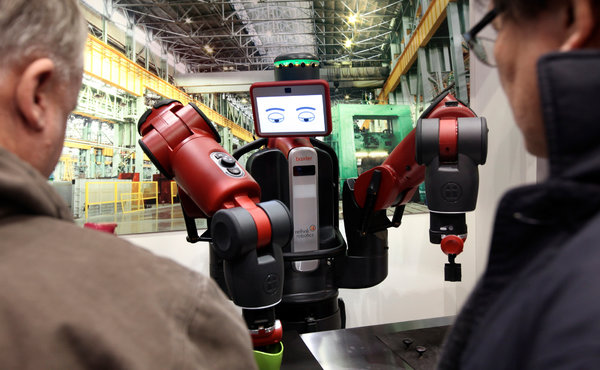The robot-v-worker debate on job losses/gains
 Wednesday, January 30, 2013 at 10:24AM
Wednesday, January 30, 2013 at 10:24AM 
Subject is, do robots kill more jobs than they create?
We've approached this question many times in various Wikistrat sims, and they are many thoughts on the subject.
In a macro sense, the nightmare scenario is silly: no society is going to job-destroy its way to rule by robots. The amateur economist in me believes life just migrates into new areas, so there are plenty of jobs creating robots and economic activity moves on to new challenges/spheres/what have you.
But in the near-term sense, people's perceptions of the disruptive churn (sure to happen) matter a whole lot.
So this NYT report by the always smart John Markoff on a recent robotic industry conference that sought to allay some of these fears (robots everywhere!).
Some counter-arguments:
- US automating and using more robots but it's still the biggest manufacturing country in terms of dollar value (I thought Germany was, but we're up there, so point taken), so we have to remember that that "manufacturing produces more jobs in associated areas than anything else."
- Neither Europe nor Japan seems to share our fears on this subject.
- Without automation, you can't compete globally. So if you want to steel back those jobs from China, this is how you do it.
- "Countries that have high productivity can afford to have a good social system and a good health system." Germany and Sweden are considered great examples of this.
Hmm. Not exactly decisive, but you get the idea. Nobody wants to own the world's most manpower-intensive manufacturing sector - except maybe Bangladesh. So there's no way to go except onward and upward, as my Dad used to say. Manufacturing, if highly productive, still wins and creates wider wins in your economy.
But yeah, you still have to beat the next guy - and his robot.
 global economy,
global economy,  global trends,
global trends,  technology | in
technology | in  Citation Post |
Citation Post |  Email Article |
Email Article |  Permalink |
Permalink |  Print Article
Print Article 









Reader Comments (3)
"Robot" is also a codeword for "incompetent management". I've worked introducing robots into manufacturing and other industries since 1982. During that time I've seen an extensive parade of incompetent management strategies hiding behind a "use robots" smokescreen. The employees are not fooled by the smokescreen into thinking that the management is suddenly competent. They rightly oppose the "use robots" schemes because they are right in expecting incompetent execution and inappropriate selections.
An old example is parallel visits by a Japanese car maker and a Detroit car maker during the 1980's. The Japanese visitors discussed "how to improve quality and reduce cost". The Detroit visitors talked about "getting the finest robots". Both got what they looked for. The Japanese got higher quality lower cost cars, and Detroit got a warehouse full of the finest robots. This pattern repeats extensively, and makes the opposition to robots more ambiguous.
Other countries also have incompetent management, but they haven't used the "use robots" smokescreen nearly as much, so robots lack the tarnish of being associated with incompetence.
Tom,
The issue that I have here is one of anthropomorphism. A robot is not a human looking thing but a device that performs work or makes it easier to perform. Dishwashers are robots, automatic transmissions are robots, spell-check are robots. All of these makes work easier. In he past, this automation was targeted at repetitive or hard physical labor, today it is targeted to repetitive intellectual work. I do agree with you that work will still exist, there may not be work for those that have displaced work. Just like the muscle-bound digger, people who won't or can't adapt to work that involves creativity or adversarial thinking against other humans in unbounded environments will be displaced. This provides an issue of how do we train experts if there is no ladder to spend 20 years improving to get to that stage.
P.S. There is also a chance a la Ray Kurzweil that sometime in 2029, even creativity can be automated. At that point, I don't know society will transform when event group human intellectual labor becomes cheaper in dry silicon vs. squishy brains.
The fly in the ointment is labor mobility ossification. If you are tied in to state social programs, maybe your mortgage is upside down, and your current employer benefits make you too scared to switch to a field more in demand in a far away state then changes get more painful and more difficult.
One desperate need for labor right now, going through all the corporatist deals of the past century plus in all 89k governments in the US to ease economic friction and increase employment. But who would pay for such a thing?